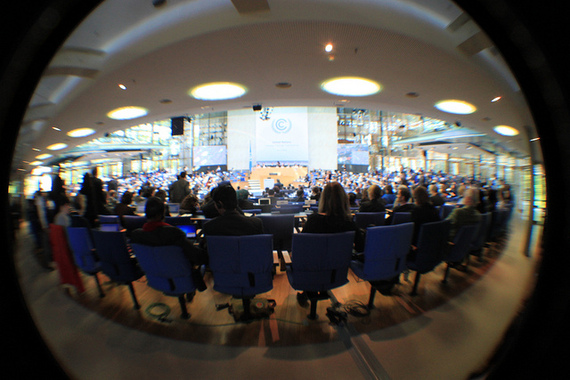Maybe I've lived outside the U.S. too long, or maybe my mind is just totally focused on the start of next week's international climate talks in Warsaw. But I think I may have been the only one who reacted somewhat cynically to last week's news that President Obama had signed an Executive Order "Preparing the United States for the Impacts of Climate Change."
Reactions from my American colleagues were overwhelmingly positive to the announcement. And understandably so I suppose; preparing the nation for the present and future impacts of climate change is vital.
For that matter, looking at U.S. climate policy from a domestic perspective, I'd also take my hat off to the Obama administration for developing a credible plan to implement its emissions reduction target. And we can count ourselves lucky that a passionate climate advocate such as John Kerry is leading the U.S. diplomatic effort.
But there's another side to the equation, the side where the U.S. is one of 194 countries meant to be working cooperatively to solve the climate crisis. And that's where the U.S. plays anything but an admirable role.
Let's remember that the U.S. emissions reduction target represents a pitiful 4% cut by 2020 on 1990 levels.
In 2007 the Intergovernmental Panel on Climate Change (IPCC) said that emissions reductions by countries such as the United States needed to be in the range of 25-40 percent below 1990 levels by 2020 just to have a 50-50 chance of keeping temperature rise below the catastrophic threshold of 2°C. A goal, I should add, that world leaders including President Obama committed themselves to.
Yet according to the Environmental Protection Agency, U.S. emissions of greenhouse gases INCREASED by 10 percent between 1990 and 2010. When you consider that the U.S. is the largest historical emitter, the 4 percent promise just isn't right.
Last month, speaking at Chatham House in London, U.S. Climate Envoy Todd Stern set out the U.S. position for the next round of negotiations meant to achieve a new climate agreement in 2015. To no one's surprise, he called for a "flexible" approach. He said that "rather than negotiated targets and timetables, we support a structure of nationally determined mitigation commitments, which allow countries to "self-differentiate" by determining the right kind and level of commitment, consistent with their own circumstances and capabilities."
This is nonsense. It's like saying citizens should voluntarily determine how much income tax to pay based on how much they feel they can afford. Can you imagine preparing a budget and working out what you can spend under such circumstances? This approach is just as illogical when applied to the climate crisis.
In September, the latest report of the IPCC identified a global carbon budget for the first time. It is around a trillion metric tons of CO2, of which about half has already been spent. At current levels of emissions, we are likely to use up the remainder in the next 15-25 years.
The last thing we need right now is "flexibility." What we need is for President Obama to live up to his inaugural promise made less than one year ago, to "respond to the threat of climate change, knowing that the failure to do so would betray our children and future generations." What we need is for the U.S. to ratchet up its ambition, including by providing much more funding to help those countries which did the least to create the problem cope with the impacts. But in essence, the U.S. is putting the brakes on the 2015 negotiating process before it's barely begun.
So this explains my cynical reaction to the news that the U.S. is now pivoting to adaptation in "an acknowledgment that worldwide efforts to control emissions will be inadequate to head off big climatic shifts."
It brings to mind a verse in one of my favorite songs at the moment, "Shelter" by the Tedeschi Trucks Band:
They made their promises then they walked away
Fair-weather friends are gone for good
You never cared about what others had to say
And through it all you understood...

